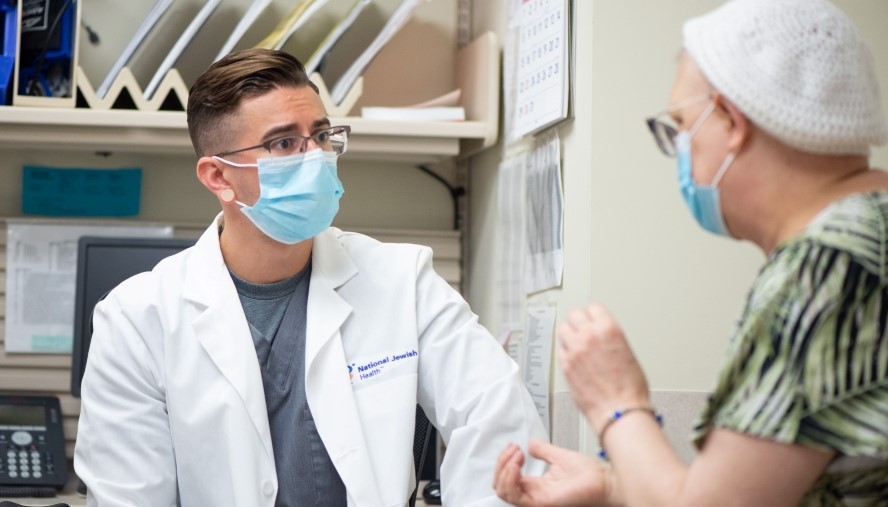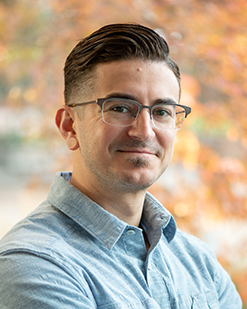Cardio-Oncology Program
 Cardio-oncology treats damage to the heart and its system. This damage is called cardiotoxicity. It is caused by some cancer treatments.
Cardio-oncology treats damage to the heart and its system. This damage is called cardiotoxicity. It is caused by some cancer treatments.
The Cardio-Oncology Program at National Jewish Health in Denver, Colorado, prioritizes heart health before, during and after cancer treatment. The program is led by Chris Fine, MD. He is a fellowship-trained and board-certified cardiologist. Dr. Fine also has dedicated training in cardio-oncology. He is one of the few board-certified cardio-oncologists in the country.
The Cardio-Oncology Program can help adults who are current cancer patients. It can also help adult cancer survivors. Between 60% and 90% of long-term cancer survivors will develop chronic health conditions, including heart disease. Our goals are to prevent, limit and possibly reverse the impact of cancer treatment on the heart.
Cardio-Oncology Program Highlights
- Board-certified cardio-oncologist with dedicated cardio-oncology training
- Care co-managed with your cancer care team
- Comprehensive and tailored evaluation for cardiotoxicity risk
- Latest and most advanced cardiac testing (one of the few hospitals nationwide to offer cardiopulmonary exercise testing)
- Minimize interruption of cancer treatment
- Multidisciplinary approach
- Personalized diagnosis, treatment plan, protective strategies and long-term follow-up care
- Rehabilitation services, nutrition counseling, patient education, clinical trials and other services available at the National Jewish Health main campus
- Risk assessment and optimization
- Survivorship and ongoing monitoring
Personalized Medicine and Care
The Cardio-Oncology team will work with you and your cancer care team. We will develop a comprehensive evaluation and treatment plan that is personalized to your needs. This individual attention balances cancer therapy with heart protection. We want to ensure the best possible cancer care with the lowest impact on your heart. Plans may include:
- Risk assessment
- Risk-based diagnostic evaluation
- Minimizing cancer treatment interruption
- Treatment of cardiotoxicities
- View other medical conditions, special needs and lifestyle issues
- Whole-person approach addresses medical conditions, special needs and quality of life
A Team Focused on You
We are here to partner with you and your cancer team. We want to protect your heart from cancer treatment. Our multispecialty team may include other specialists, nurses, registered dietitians and others who can help you navigate your cancer journey.
Doctors

Chris Fine, MD, FACC
Reasons to Choose National Jewish Health
- The leading respiratory hospital in the nation and the only one devoted fully to the treatment of respiratory and related illnesses
- Ranked #1 or #2 in Pulmonology by U.S. News & World Report for 26 consecutive years
- Ranked in the top 5% of hospitals in the nation by HCAHPS
- Physicians consistently recognized among the best in the nation by multiple services, including Best Doctors in America and Castle Connolly
- Among the top 6% of organizations funded for research by the NIH, providing patients access to hundreds of active clinical trials
- 124-year history of focus on care, research and education serving patients from around the world with lung, heart, immune and related disorders

Back on Board
Fortunately, in this case, Dunn’s surgery was performed at just the right time. Not only was the procedure a success but, because the condition was caught in the early stages, it was minimally invasive.
Read MoreNationally Recognized Expertise
National Jewish Health is recognized nationally for its expertise in pulmonology, cardiology and oncology.
- Our hospital is recognized as a top respiratory hospital by U.S. News & World Report, as well as a Lung Cancer Surgery high performing hospital.
- The Rocky Mountain region’s most comprehensive heart evaluation, consultation and advanced cardiac imaging services
- National Press Ganey surveys have found that 95% of all patients would recommend National Jewish Health providers to a friend or relative. Our providers received especially high ratings in communication, joint decision making and patients’ confidence in care providers.
- Our cardiologists are ranked as Top Doctors by Castle Connolly and 5280 Magazine.
- Our physician-scientists and researchers regularly published in peer-reviewed scientific journals, including many of the most influential publications such as The New England Journal of Medicine, Clinical Cardiology, International Cardio Oncology Society, JAMA and Nature.
- Our physicians and scientists are often invited to present at national and international conferences where physicians gather to learn about the latest advancements in medicine.
Benefit from the Latest Research
Our physician-scientists and researchers have long been leaders in cardiology and oncology research ensuring that patients can benefit from the latest advancements. This research includes:
- Development of diagnostic tests
- New treatments and therapies for symptoms
- Studies to improve the quality of life for heart disease patients
Clinical Trials & Research Studies
National Jewish Health offers clinical trials and research studies for patients with heart disease and cancer. Our research coordinators can help determine which studies may be right for you.
Make an Appointment
You may be referred by your doctor, or you can request an appointment without a referral to our Cardio-Oncology program.

 Clinical Trials
Clinical Trials